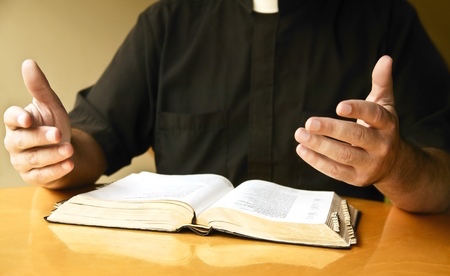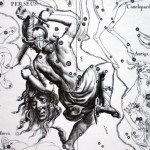Do Catholics Know That Their Theology is Correct?
by Steven Dillon
Filed under Belief
NOTE: Today we feature a guest post from Steven Dillon, one of our regular non-Catholic commenters. On Wednesday, we'll share a response from Catholic writer Brandon Vogt.
This site is primarily a forum for dialogue between Catholics and atheists. We can see this clearest on the part of the Catholic contributors who post about everything from the influence of Catholicism on science, and the crusade history to Marian apparitions and Catholic policy in the public school system. By contrast, the atheist contributors seem to have focused almost exclusively on posting about God’s existence, occasionally venturing into territory like whether Jesus of Nazareth really existed. But, there is much more for atheists to discuss with Catholics.
For example, an atheist can discern the Catholic Church’s claim to having not contradicted itself in any of its official teachings. E.g. The extraordinary magisterium decreed – through the 15th century Council of Florence – that whoever dies in the state of original sin alone goes to hell. But, no one can die in the state of original sin alone if, as the universal and ordinary magisterium currently teaches, God gives everyone the grace necessary to be saved; for the acceptance of this grace removes original sin and its rejection adds mortal or venial sin. Which infallible magisterium is right?
Or again, the Vatican Council of 1870 claimed that through the words attributed to him in Matthew 16:18-19, Jesus promised to confer a primacy of jurisdiction over the whole Church upon Peter. But, an atheist can use what tools scholarship affords us to test how plausible this interpretation is. E.g. Had these words been understood by the earliest Christians to be of such ecclesiological importance, wouldn’t they have been multiply and independently attested? Given his explicitly stated purpose of recording such details, how could Luke have failed to even mention this, especially since he records a parallel version of this very event in Luke 9:18-20?
These and many other issues could prove to be fruitful grounds for discussion and debate. But, I’d like to steer this in the direction of another discussion starter: do Catholics know that their theology is correct? The status of theological belief is quite a divisive one in the philosophy of religion. Many, many thinkers from atheists to Pagans are of the mind that there is no theological knowledge. We only have varying degrees of reasonable and educated opinions. But, equally many thinkers from Christians to Muslims are of the view that there is such knowledge. Needless to say, if belief in Catholicism were at best educated opinion, the dynamic between atheists and Catholics would be drastically altered.
I’m going to argue – in an introductory way – that it should be. Theology is the theorizing about a piece of divine revelation, and thus takes it for granted that there is divine revelation to theorize about. It is not the theologian’s job – in that capacity – to demonstrate that the Bible is inspired by God, or that Allah commissioned Mohammed as his prophet. That task is left to the philosopher, who may in turn rely heavily on experts of other fields, such as historians and physicists. The foundation that philosophers lay for theologians is called the preamble of faith, and consists in beliefs such as that a specific divinity exists and has in fact issued revelation. But, regardless of how certain the preamble of faith is, the theologian offers nothing like certitude. Theologians may propose various reasons to think such-and-such divine revelation means this-or-that, and their reasons may even be very strong, but they don’t endow one with knowledge. The difference between an amateur theologian’s views and an expert’s is one between an opinion and an educated opinion. Why agree with me?
Every theologian is either an amateur at theorizing about divine revelation or an expert. If she is an amateur, then she is not qualified to know of what she speaks. You might expect that she can just defer to someone who does. But, expert theologians are in scarcely a better position, for their reasons for holding this-or-that theological belief have not been good enough to persuade any significant portions of their peers even after centuries and centuries of scholarship. It’s no secret that instead of tending towards unity, Christianity has only fractured over time. The reasons one faction offers for believing whatever they do about divine revelation haven’t just failed to convince likeminded individuals, they’ve even fueled dissolution! Yet, each faction boasts of highly trained experts in theological matters. If experts do not have good enough reasons to settle a dispute, then the dispute is not settled. The fact of the matter is not yet known.
Note, I’m neither saying it’s unreasonable to hold any theological belief, nor that Christianity enjoys no doctrinal unity whatsoever. By all means, hold those opinions which are reasonable for you to do so, and if the conciliar creeds prove anything, it’s that Christian factions are not at complete theological odds. But, experts in Christian theology are in anything but agreement, and evangelization is like a fish out of water when based on opinion.
The theologian might object that the reluctance theologians have manifested toward changing their minds does not show that their reasons aren’t knowledge-conferring. It may just as easily show that other theologians are blinded by sin. We could of course wonder why these reasons wouldn’t be good enough to cut through sin, but more importantly, how do we know there is sin to be blinded by? One’s mere opinion on the matter does not a robust response make.
Finally, some may worry that I’m advocating a form of relativism here. But, I’ve been careful not to talk about whether theological beliefs are true, only whether they are reasonable, and if so, how much? Are they so reasonable as to count as knowledge?
Whatever else you may have thought about the issue before reading this, and however this may have changed your mind, I hope it raises a number of questions about the nature of theological knowledge and opens another avenue for dialogue between the folks here.
Related Posts
Note: Our goal is to cultivate serious and respectful dialogue. While it's OK to disagree—even encouraged!—any snarky, offensive, or off-topic comments will be deleted. Before commenting please read the Commenting Rules and Tips. If you're having trouble commenting, read the Commenting Instructions.













